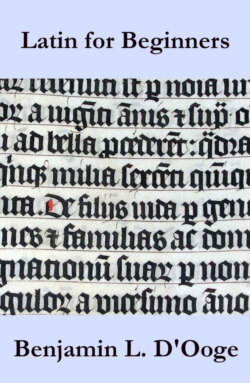Читать книгу Latin for Beginners - BENJAMIN L. D’OOGE - Страница 49
На сайте Литреса книга снята с продажи.
Оглавление[Special Vocabulary]
NOUNS
«ager, agrī», m., field (acre) «cōpia, -ae», f., plenty, abundance (copious); plur., troops, forces «Cornēlius, Cornē´lī», m., Cornelius «lōrī´ca, -ae», f., coat of mail, corselet «praemium, praemī», n., reward, prize (premium) «puer, puerī», m., boy (puerile) «Rōma, -ae», f., Rome «scūtum, -ī», n., shield (escutcheon) «vir, virī», m., man, hero (virile)
ADJECTIVES
«legiōnārius, -a, -um»,[A] legionary, belonging to the legion. As a noun, «legiōnāriī, -ōrum», m., plur., legionary soldiers «līber, lībera, līberum», free (liberty) As a noun. «līberī, -ōrum», m., plur., children (lit. the freeborn) «pulcher, pulchra, pulchrum», pretty, beautiful
PREPOSITION
«apud», among, with acc.
CONJUNCTION
«sed», but
[Footnote A: The genitive singular masculine of adjectives in «-ius»
ends in «-iī» and the vocative in «-ie»; not in «-ī», as in nouns.]
«91.» «Declension of Nouns in -er and -ir.» In early Latin all the masculine nouns of the second declension ended in «-os». This «-os» later became «-us» in words like «servus», and was dropped entirely in words with bases ending in «-r», like «puer», boy; «ager», field; and «vir», man. These words are therefore declined as follows:
«92.» «puer», m., boy «ager», m., field «vir», m., man BASE «puer-» BASE «agr-» BASE «vir-»
SINGULAR TERMINATIONS
Nom. puer ager vir —— Gen. puerī agrī virī -ī Dat. puerō agrō virō -ō Acc. puerum agrum virum -um Abl. puerō agrō virō -ō
PLURAL
Nom. puerī agrī virī -ī Gen. puerōrum agrōrum virōrum -ōrum Dat. puerīs agrīs virīs -īs Acc. puerōs agrōs virōs -ōs Abl. puerīs agrīs virīs -īs
a. The vocative case of these words is like the nominative, following the general rule (§74.a).
b. The declension differs from that of «servus» only in the nominative and vocative singular.
c. Note that in «puer» the «e» remains all the way through, while in «ager» it is present only in the nominative. In «puer» the «e» belongs to the base, but in «ager» (base «agr-») it does not, and was inserted in the nominative to make it easier to pronounce. Most words in «-er» are declined like «ager». The genitive shows whether you are to follow «puer» or «ager».
«93.» Masculine adjectives in «-er» of the second declension are declined like nouns in «-er». A few of them are declined like «puer», but most of them like «ager». The feminine and neuter nominatives show which form to follow, thus,
MASC. FEM. NEUT.
līber lībera līberum (free) is like «puer» pulcher pulchra pulchrum (pretty) is like «ager»
For the full declension in the three genders, see §469.b. c.
«94.» Decline together the words «vir līber», «terra lībera», «frūmentum līberum», «puer pulcher», «puella pulchra», «oppidum pulchrum»
